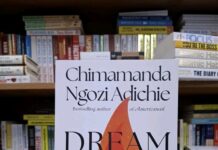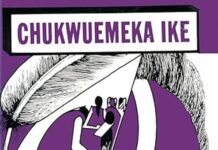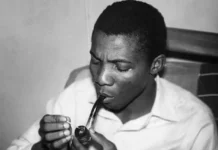📢 Follow our WhatsApp Channel for the latest literary updates!
Act 1 of Ola Rotimi’s Kurunmi is patterned into three scenes. The act is titled “Termites Dwell Underground.” It draws insights into the underlying issues that give rise to the conflict in the play.
Act 1, Scene 1 Summary
This scene opens in Kurunmi’s agbo’lé (compound) in Ijaiye. The place is littered with ancestral gods, an indication of the spiritual influence Kurunmi exudes in Ijaiye. It is the occasion of a feast organized by Kurunmi and the people of Ijaiye are present to partake in the feast. Abogunrin and Balogun Ogunkoroju prepare the people for the arrival of Kurunmi. Each extols Kurunmi for his leadership qualities and speak highly of him.
Then, Asunrara (a professional praise chanter), signalled by the rushing in of Kurunmi’s bodyguards, takes over from where the two stopped. His praise chant of Kurunmi’s valour heralds Kurunmi’s appearance.
Kurunmi comes on stage and immediately announces to his people the sacrilege committed at the council meeting convened by the Alafin. Speaking in proverbial words, he tells them what transpired at that meeting with Alafin Atiba in Oyo in which Oni Ife, Timi Ede and Bashorun were all present. Oba Atiba had told them to swear by the Sword of Ogun in his right hand and the bolt of Sango in his left hand that his son, Adelu, would be the king of Oyo after his demise.
Kurunmi expresses how disgusted he was by the suggested perversion of the tradition that made him walk out of the meeting. He tells the crowd that others at the meeting had acquiesced to Alafin Atiba’s request: “They spoke the words of the corrupt in the face of truth.” His audience is stunned by this revelation. The Alafin’s first son, the crown prince, is meant to commit suicide after the king joins his ancestors. This is the dictate of the tradition.
Next, Bashorun Oluyole and Timi Ede come to see Kurunmi. The atmosphere around the three is tensed. Kurunmi is disgusted by the presence of the two. They warn Kurunmi in his capacity as the chief warrior of the kingdom not to rip the kingdom apart by his decision. They remind him of his sacred duty which is to protect and fight for their people.

Kurunmi however claims that it is them, not him, that are bent on tearing the kingdom apart. They are the ones who want to change the tradition, not him.
“whenever an Alafin dies, his first son, that Alafin’s first son, must also die with him.”
Kurunmi.
The two elders are of the position that “tradition must change with man.” They tell him they have sworn to make Adelu the king but Kurunmi vehemently maintains that Adelu would not be the king over his people. They remind him that Ijaiye is part of Oyo and he is the Chief of Ijaiye, thanks to Alafin Atiba. Kurunmi’s action would therefore count as insubordination if he goes through with his decision.
The encounter reaches a dead end and the two visitors take their leave. After they left, Kurunmi lifts an idol he is moulding and dashes it on the ground. His five sons (Arawole, Efunlabi, Ogunlade, Fatoki, and Sangodele) rush in armed at the sound of the crash. They ask their father what is wrong. He tells them “Adelu will be King” and they all pray for the prevention of such abomination. And the scene ends here.
Act 1, Scene 1 of Ola Rotimi’s Kurunmi is significant in that it sets the tone for the conflict in the play. It showcases the ideological differences between Kurunmi and the visiting chiefs. While Kurunmi holds that tradition is the essence of every man and should be protected from perversion, Timi and Oluyole believe that tradition must change with times and man. This point of divergence would culminate into a bloody civil war.
Read: Characterisation in Ola Rotimi’s “Kurunmi”
Act 1, Scene 2 Summary
This scene is a very short one. Much of it is mimetic and do not involve dialogues. The readers are introduced to Reverend Mann and Mrs Mann and a few Ijaiye Christian converts. They are at the town square when they are interrupted by the drumming and theatrics of an Egungun and his followers. Before they could get to them, Mrs Mann leaves the stage under the protection of an Ijaiye Christian devotee upon the persuasion of Reverend Mann.

Afterwards, Reverend Mann suffers an onslaught from the masquerade and his frenzied mob that leaves him bleeding from a slash on his forehead.
This brief scene is significant in a number of ways. First, the presence of Rev. Mann is symbolic of the establishment of Christianity in Ijaiye and other parts of Yoruba land. Then, it signifies a clash of cultures, especially as it regards African traditional religion and Christianity. The friction between the two underlines the conflict between tradition and change which pervades the play.
Read: Memorable Quotes from Ola Rotimi’s “Kurunmi”
Act 1, Scene 3 Summary
The setting of Scene 3 is Kurunmi’s agbo’lé. Kurunmi gives instructions to Akpa, his bodyguard, to deliver a message to Bale Olugbode and Balogun Ibikunle of Ibadan that he, Kurunmi, does not recognize the legitimacy of the newly crowned Alafin Adelu of Oyo because his ascension to the throne is a flagrant violation of the tradition.
While at it, Abogunrin rushes in to tell Kurunmi that royal messengers from Oyo are there to see him but Kurunmi disregards the message till he is done with instructing Akpa who is eventually accompanied to Ibadan by ten soldiers.
Kurunmi then attends to Alafin’s messengers, Kutenlo and Obagbori, who bear an important message from Alafin to Kurunmi. They ask him why he wasn’t present at Adelu’s crowning. In response, Kurunmi reiterates his position that he doesn’t recognize the legitimacy of Adelu. To demonstrate this, he scops the okro stew brought to him by his wife, Mosadiwin, into his mouth and thereafter smears a white cloth with it in contempt of the Alafin. He hands over the smeared cloth to the messengers to deliver to Adelu.
Seeing this, Kutenlo and Obagbori launch into the message sent by Adelu proper. They give Kurunmi the option to choose one of the two calabashes they brought with them. The calabash which contains bullets and gunpowder means war while the other calabash which contains the sacred twins of Ogboni cult means peace. Kurunmi chooses bullets and gunpowder, damning the consequences. The messengers leave to deliver the message of Kurunmi’s choice to Alafin Adelu.
Kurunmi begins war preparations in earnest. He sends Lakusa to the Emir of Ilorin, and to Balogun Somoye and the Elders of Egba to seek their support and alliance in the brewing war. These two factions are noticeably not on speaking terms with Oyo, and this, of course, is what Kurunmi is banking on.
He calls two of his subordinates, Ajayi Areagoro and Balogun Ogunkoroju. He instructs the former to ensure no one sells food out of Ijaiye. He tells the latter to prepare the warriors for war in his capacity as the chief of Kurunmi’s soldiers. There is a little brawl between Kurunmi and Balogun Ogunkoroju when the latter claims ‘the land is not quite ready for war.’ Kurunmi thereafter makes Ogunkoroju see why they have to go to war regardless of the state of things — Adelu has challenged them to a war. He convinces Ogunkoroju to acquiesce in his decision.
After this, Labudanu, one of the soldiers sent to Ibadan, returns to warn Kurunmi that the people of Ibadan are already preparing for war against Ijaiye in support of Oyo. He meets Kurunmi in the middle of a supplication to Ogun. Kurunmi is unfazed by this news knowing full well the horrors of his power he showed them at the battle of Odogido. While at it, Rev. Mann enters and Labudanu exits.
Rev. Mann complains to Kurunmi about how Ijaiye people have refused to listen to the gospel of Christ and instead, they attack him and his people. He shows Kurunmi the wound on his forehead as a testament to injuries sustained on one such attack. In response to Rev. Mann’s complaints, Kurunmi cynically questions why his people should abandon their ancestral practices in preference for Rev. Mann’s ancestral religion. He offers to treat Rev. Mann’s wound but the white man declines Kurunmi’s offer. Arawole, one of Kurunmi’s sons, comes in on the two as they hold their conversation.
Rev. Mann leaves afterwards. Five armed Ijaiye warriors (Epo, Fanyaka, Akiola, Asegbe, and Amodu) rush in menacingly on Kurunmi and Arawole. Arawole draws his sword in defence but Kurunmi instructs him to drop his sword. The warriors complain that Kurunmi does not carry Ijaiye people in his decisions. They even allude to how he pressured Balogun Ogunkoroju to accept his decision.
The warriors are evidently there on the instructions of Balogun Ogunkoroju and Areagoro. Kurunmi feels betrayed by his trusted brothers. However, the warriors claim he has become too powerful in a very choking manner.
This dramatic confrontation ends with Kurunmi swearing by Ogun on the request of the warriors that he will always seek the Elders of Ijaiye for counsel in any actions he intends to take. Thus, Ijaiye goes into the war united on all fronts.
Act 1, Scene 3 of Ola Rotimi’s Kurunmi is significant in a number of ways. One, it sets the stage for a war between Ijaiye and Oyo and their respective allies. Kurunmi’s choice of the calabash of bullets and gunpowder signals this. Two, the dialogue between Rev. Mann and Kurunmi gives us the impression of Kurunmi as a die-hard traditionalist who is over-protective of the ways of his forebears. Three, the confrontation between Kurunmi and five of his warriors spells out Kurunmi’s possessive and overwhelming power. By subjecting their leader to an oath, the warriors help bring Kurunmi’s power in check and accountable.
Join Our Social Media Channels:
- WhatsApp: Literature PADI
- Telegram: Literature PADI
- YouTube: @literaturepadi
- Facebook: Literature PADI











